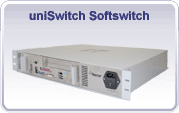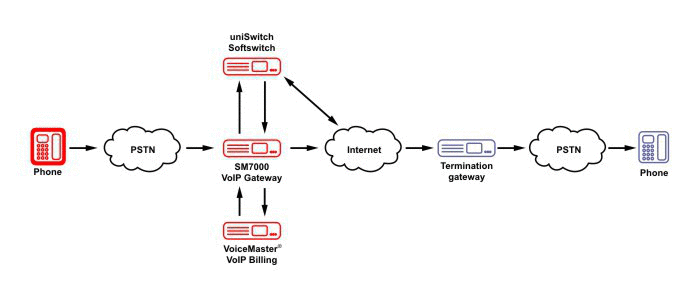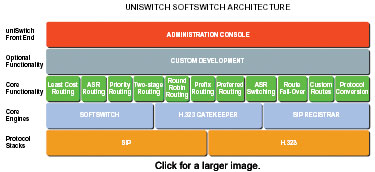uniSwitch Softswitch
Product Overview
 uniSwitch is a VoIP Softswitch that offers flexible routing between VoIP networks, carrier grade reliability and high scalability. The product supports multiple routing methods, including Least Cost Routing, ASR Routing, and Priority Routing which enables providers to select the most profitable and high quality routes for each call, and increase call completion rates, revenues and profits. With the uniSwitch Softswitch, service providers benefit from improved call completion rates, higher revenues, less revenue leakage, and improved network security and availability.
uniSwitch is a VoIP Softswitch that offers flexible routing between VoIP networks, carrier grade reliability and high scalability. The product supports multiple routing methods, including Least Cost Routing, ASR Routing, and Priority Routing which enables providers to select the most profitable and high quality routes for each call, and increase call completion rates, revenues and profits. With the uniSwitch Softswitch, service providers benefit from improved call completion rates, higher revenues, less revenue leakage, and improved network security and availability.
Key Features
- Multiple Routing Mechanisms
- Topology Hiding
- H.323/SIP Protocol Conversion
- Proxy Mode Support
- Routed Mode Support
- Routed Mode w/o H.245 Support
- Static Mode Support
- High Scalability
- ASR Route Switching
- Route Fail-over Support
- Universal Connectivity

Multiple Routing Mechanisms
uniSwitch Softswitch supports multiple routing mechanisms, including Least Cost Routing, ASR Routing, Priority Routing, Two-stage Routing, Preferred routing, Route Fail-Over and others. By providing multiple routing options, the VoIP softswitch enables providers to select the most profitable and high quality routes for each call and increase call completion rates, revenues and profits.
Topology Hiding
Using uniSwitch Softswitch, providers can securely separate their VoIP networks from the outside IP world. The VoIP softswitch can act as a traffic proxy between out-of-network VoIP terminals and in-network equipment thereby preventing outsiders from seeing the true topology of the protected network.
H.323/SIP Protocol Conversion
The protocol conversion functionality of uniSwitch Softswitch ensures maximum interoperability with third party VoIP equipment. The VoIP softswitch can translate signaling messages from SIP to H.323 and vice versa and thus bridge calls between VoIP equipment using incompatible protocols.
Proxy Mode Support
uniSwitch Softswitch can operate in proxy mode in which both signaling (RAS) and voice (RTP) traffic flow through the softswitch. Such bandwidth intensive mode is suitable for establishing connections to terminals behind NAT and to terminals that want to keep their identities private. In proxy mode the VoIP softswitch exercises full call control and can disconnect calls in progress if necessary.
Routed Mode Support
In routed mode, uniSwitch Softswitch requires less bandwidth. In such mode the VoIP softswitch performs direct control of signaling (RAS) messages only; voice (RTP) traffic is exchanged gateway-to-gateway. In routed mode the VoIP softswitch exercised substantial degree of call control and can disconnect calls in progress if necessary.
Routed Mode w/o H.245 Support
This operating mode of uniSwitch Softswitch mimics Routed Mode with the difference that H.245 call signaling is handled by the participating gateways, not the VoIP softswitch. Routed Mode w/o H.245 enables uniSwitch to reduce further bandwidth utilization while still preserving substantial degree of call control.
Static Mode Support
In static mode, both signaling (RAS) and voice (RTP) traffic are exchanged directly between participating gateways. In such mode uniSwitch Softswitch consumes least bandwidth but does not have control over calls in progress.
High Scalability
uniSwitch Softswitch is offered in standard and carrier editions to address the capacity needs of both emerging and established telecoms and service providers. Depending on the business model and infrastructure in which uniSwitch is utilized, the standard edition can support up to 500 concurrent calls, whereas the carrier edition can handle up to 1,000 concurrent calls.
ASR Route Switching
uniSwitch Softswtich offers ASR route switching capabilities to ensure higher call completion rates and reduced revenue loss. The VoIP softswitch monitors all end terminals in real-time and automatically disconnects those, whose ASR rates fall below critical values preset by system administrators.
Route Fail-over Support
uniSwitch Softswitch offers a mechanism to ensure high network availability. The VoIP softswitch can be configured to periodically conduct L3, L4, and L7 remote service checks and re-route (fail-over) calls to alternative remote terminals if existing ones become unavailable.
Universal VoIP Equipment Connectivity
uniSwitch Softswitch offers a number of features to ensure universal connectivity with other VoIP terminals. In particular, the VoIP softswitch can accept traffic from both registered and non-registered terminals and can terminate traffic to gatekeepers, gateways and softswitches.








 Wholesale VoIP
Wholesale VoIP 














